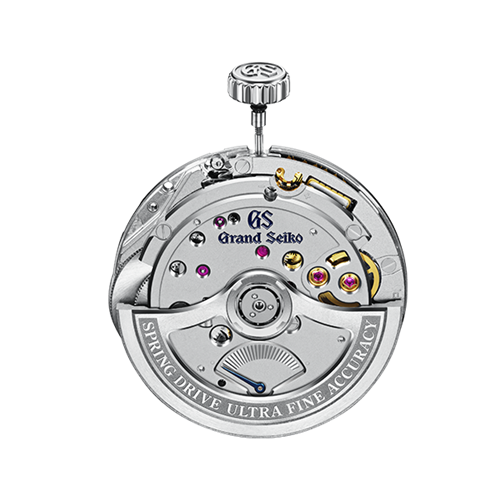
9F Quartz
Precision and longevity are the very essence of the ideal timepiece and had always been central to the ideals of Grand Seiko. Caliber 9F was designed to bring these attributes to the quartz watch and it set new standard for quartz in every aspect of its performance.
- The Instant Date Change Mechanism changes the date display in the blink of an eye.
- Torque comparable to that of a mechanical movement makes the long and wide hands of Grand Seiko possible.
- The Backlash Auto-Adjust Mechanism ensures that the seconds hand lands exactly on the marker with no shudder, adding to the precision with which the time can be read.
- The sealed structure improves the retention of the lubricating oils and prevents any dust entering the movement when the battery is changed.
A quartz movement depends on a battery as a power source. The battery sends electricity to a quartz oscillator, which vibrates at precisely 32,768 times per second. An integrated circuit (IC) detects these vibrations and sends out an accurate time signal every second to the step motor. The step motor activates in accordance with this time signal, accurately rotating a series of gears and the watch hands.
Changing the date display in the blink of an eye.
The 9F quartz movement utilizes a cam and lever in conjunction with the date indicator driving wheel as part of a feature known as the Instant Date Change Mechanism.
Through this mechanism, the date indicator driving wheel builds tension in the lever spring as it rotates, eventually releasing the stored energy when it reaches the location of the cam and driving the calendar wheel forward in the blink of an eye.
While some mechanical movements possess enough torque to deliver instant date changes, Grand Seiko was the first to pioneer the mechanism in a quartz movement.
The task of aligning the Instant Date Change Mechanism to occur precisely at midnight falls upon Seiko's skilled craftsmen, who painstakingly set the mechanism by hand. In order to ensure that there is no situation in which the change occurs prematurely, the mechanism is set to activate within five minutes of the midnight.
A quartz movement crafted by hand
While the majority of the world's quartz movements are products of automatic assembly, Grand Seiko's 9F quartz caliber is assembled entirely by hand. Two expert craftsmen combine their individual talents to ensure the high quality standard of each Grand Seiko 9F movement, with one assembling the date indicator and the other the rest of the movement.
Assembly and Adjustment
Once the movement is assembled, the dial, markers and hands are attached and the entire movement installed into the case. Attaching the watch hands is perhaps one of the most delicate and precise procedures requiring the supreme skill of an experienced craftsman or woman.
The hour and minute hands are stacked in parallel within a space of just 2mm and fixed in place with the movement axis by frictional force. Only an expert in adjustment can ensure that all hands, a mere 0.2mm apart, operate smoothly without colliding with one another as they rotate.
In order to ensure that no scratch or blemish occurs to the hands during assembly, the Grand Seiko craftsmen and women polish the tips of their pincers several times every day. This is just one example of the painstaking detail involved in the creation of every Caliber 9F watch. It is this craftsmanship and skill that guarantees the quality, performance and beauty of every Grand Seiko quartz watch.
Adjustment to your environment
Regulation switching for precision control in a quartz movement
While mechanical watches possess a mechanism for fine tuning precision, these controls are impossible in most quartz watches.
The 9F quartz movement, however, features a regulation switch that makes such precision control possible. If, because of environmental conditions or other factors, a Caliber 9F watch ever becomes too fast or slow, the switch can be used to correct for such divergences. Owners who come to know intimately the individual characteristics of their watch over the years can easily adjust the accuracy and enjoy the high precision of their watch for many years even if it is worn in unusually high or low temperatures or other conditions. Given the high accuracy of the 9F quartz movement, +/- 10 seconds a year, most will never need to know this adjustment function even exists.

Histoire
Grand Seiko se lança dans le monde de l’horlogerie en 1960, avec ses premières montres mécaniques. En 1988, la première Grand Seiko, une montre animée par un puissant mouvement se targuant d’un taux de précision de ±10 secondes par an, voyait le jour. En 1993, Grand Seiko établissait un nouveau standard dans le domaine des montres à quartz avec la commercialisation de montres de la série 9F8. Cette nouvelle série se composait de montres
équipées notamment des toutes dernières fonctionnalités signées Grand Seiko telles que le mécanisme de régulation automatique des à-coups, le système de contrôle à double impulsion et le mécanisme de changement de date instantané.
9F Quartz Movement
Movement Comparison
| Movement | Précision | Durée de vie de la pile | Remarques |
|---|---|---|---|
| Un Modèle Doté D’un Guichet De Date Et De La Fonction GMT Calibre 9F86 |
±10 secondes par an | Environ 3 ans | - |
| Un Modèle Doté D’Un Guichet De Date Calibre 9F62 |
±10 secondes par an | Environ 3 ans | - |



























